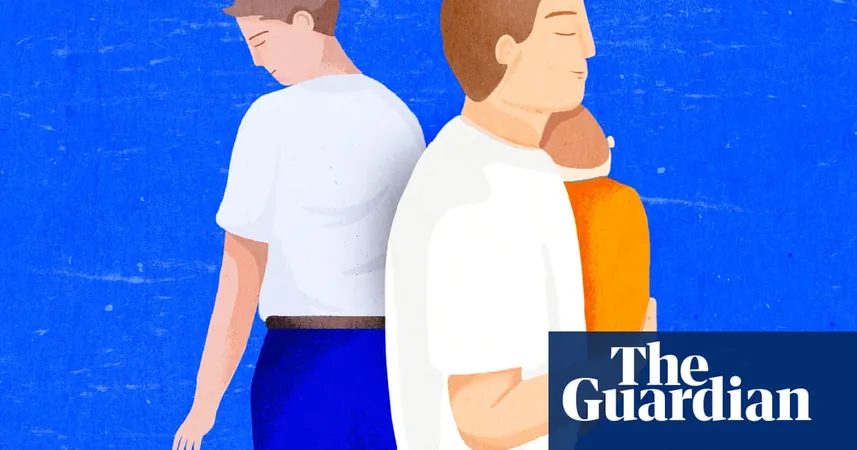
The Silent Struggles of New Fathers: Why Society Fails Dads
2025-05-31
Author: Wei
Unseen and Unsupported: The Reality for New Fathers
Dean Rogut faced the challenge of fatherhood that no parent dreams of. When his wife became pregnant, the excitement quickly turned into panic as complications arose. By the time they celebrated their son's arrival, their lives had been turned upside down.
While Dean took on the expected "support role," maintaining calm and keeping his wife informed, he felt utterly detached—like he was in a sensory deprivation tank. The stress of watching their infant son, Max, battling for survival in the NICU took a toll on him.
The Mental Health Gap for Dads
Despite the emotional whirlwind, it seemed everyone was focused on the mother's well-being. Health staff often checked in on her, but Dean received little acknowledgment of his struggles. It wasn't until months later, after hitting rock bottom—where he faced clinical depression and suicidal thoughts—that he checked into a hospital.
For decades, researchers have emphasized that the arrival of a baby can be traumatic for mothers; one in five faces perinatal anxiety or depression, leading to structured health care support. Yet, less than one in ten fathers receive similar attention, despite evidence of their mental health challenges during this period.
Isolation: A Common Theme Among New Fathers
As Associate Professor Jacqui Macdonald from Deakin University highlights, society doesn't wrap its arms around fathers the way it does for mothers. Instead, they're expected to act as secondary support, often leaving their own needs unaddressed. This creates a dangerous environment where many fathers feel invisible.
Rich Fletcher, a leading voice in fatherhood studies, describes the overwhelming isolation fathers experience. They're in a desert, unaware of their thirst for connection and support, resulting in a distressing cycle of silence.
The Cultural Shift is Necessary
The societal expectations for fathers' roles have changed dramatically over the past 30 years. While modern couples may envision an equal partnership in parenting, the system often falls short. Men are still socialized to be distant from caregiving from a young age, leaving them unprepared for hands-on parenting.
Instead of expecting dads to change their attitudes alone, we should restructure the systems surrounding childbirth to include them as active participants from the start.
Breaking the Cycle of Silence
The stigma surrounding men's mental health means many fathers neglect their needs, focusing solely on their partners and children. This can lead to destructive coping behaviors such as anger, irritability, or addiction. Macdonald emphasizes that ignoring men's issues can escalate risks for everyone—especially in times of crisis.
A Call to Action for Support
Governments must implement simple measures, such as screen-checks for new fathers, to normalize mental health support. Recent studies have shown that apps helping fathers manage their moods have been successful in improving relationships and reducing isolation.
As we push to enhance support for fathers, training for healthcare providers to engage with dads will also bridge the gap.
Reflections on a Painful Past
Now, Dean Rogut shares his journey publicly, advocating for fathers’ mental health. With his son now a teenager, he reflects on how different things could have been if he had been recognized as someone needing help.
"I don't think I would have ended up in the hospital," he asserts, wishing for a system that could have supported him before reaching his lowest point.
As we look to the future, we hope for a cultural shift that sees all parents as integral parts of the system, addressing both their needs without stigma. It's time to bring fathers into the conversation.


 Brasil (PT)
Brasil (PT)
 Canada (EN)
Canada (EN)
 Chile (ES)
Chile (ES)
 Česko (CS)
Česko (CS)
 대한민국 (KO)
대한민국 (KO)
 España (ES)
España (ES)
 France (FR)
France (FR)
 Hong Kong (EN)
Hong Kong (EN)
 Italia (IT)
Italia (IT)
 日本 (JA)
日本 (JA)
 Magyarország (HU)
Magyarország (HU)
 Norge (NO)
Norge (NO)
 Polska (PL)
Polska (PL)
 Schweiz (DE)
Schweiz (DE)
 Singapore (EN)
Singapore (EN)
 Sverige (SV)
Sverige (SV)
 Suomi (FI)
Suomi (FI)
 Türkiye (TR)
Türkiye (TR)
 الإمارات العربية المتحدة (AR)
الإمارات العربية المتحدة (AR)